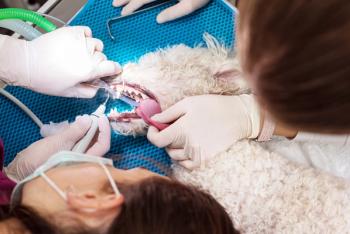
Navigating the 5 Cs of coping with compassion fatigue
Compassion fatigue is a real and dangerous threat to the health of veterinary professionals and their patients, but Licensed Professional Counselor and Certified Veterinary Technician Becky Murray has mapped out a guide for healthy coping.
Getty ImagesData from a
Psychological distress isn't just a serious problem for the stressed veterinary professional. When it takes the form of compassion fatigue, it can be harmful to colleagues and patients as well.
Compassion fatigue is a state of extreme tension caused by intense, extended periods of focusing on the suffering of others (animals included) without practicing self-care.
If compassion fatigue has you feeling burnt out on the job, you need to make some long-term changes in your life. To get through the day, though, try these tips: Navigating the 5 Cs of coping with compassion fatigue.
(Note: These tips should not be considered a substitute for professional assessment or therapy.)
Getty ImagesCalm down
When we get upset, our heart rate and blood pressure go up and our breathing can become shallow, which can increase anger, frustration or anxiety. Try grounding yourself with simple relaxation techniques.
Find a quiet place to sit, visualize a “safe place” and breathe deeply while consciously relaxing the muscles in your body. Start with clenching and relaxing the muscles in your feet, then move up. If you are in a hurry, just do this with major muscle groups. If you have time, isolate small areas and contract/relax them one at a time. Doing this for even just a few minutes can make a marked difference.
Getty ImagesCollect your thoughts
Ever had a day where it feels like nothing goes according to plan and every second seems to bring more bad news and bad attitudes? Pause and take a moment to be objective: Are things really that bad? Are people being short with you because you were short with them first? Are you having trouble focusing because there's too much on your plate? Are you feeling frazzled, obsessing over an event from earlier in the day?
Take a break and remove yourself from the situation to examine your behavior, determine the root of the problem and brainstorm ideas for resetting the tone for the day. If you really were rude to someone else, that might mean seeking out a colleague to apologize. (You'll be glad you did.)
Getty ImagesCommunicate
When something stressful or sad happens (which can be daily in a veterinary hospital), don't buy into the lie that you just have to grin and bear it. Give yourself permission to feel sad or angry. It's normal and healthy to have feelings and to express them.
Find a coworker you trust and talk about what's bothering you. Ask for objective feedback, or use it as a chance to simply get something off your chest. If the problem is another coworker, make a plan to talk to your colleague or to management at an appropriate time. Ignoring a problem does not make it go away. In fact, you are more likely to act out inappropriately when an ongoing issue continues unaddressed.
Getty ImagesControl boundaries
Remember that you are only one person and cannot accommodate every pet owner who wants to get in at the last minute or every client who asks you to call them. Set boundaries. Give yourself permission to say "no" on a really stressful day. Explain to the client that you'll do a better job when you have the time and rest to provide their pet with the proper attention and care. Saying no doesn't make you a bad veterinary professional-it can make you a better one.
There are ways to set boundaries without being rude. Let's take, for example, the client who wants to give frequent updates on her pet in the form of daily, one-hour(!) phone calls.
You might say, “Mrs. Smith, you are such an attentive mom to Fluffy. It's very helpful to know what is going on with him. Because of my schedule, I cannot speak with you every day on the phone. Why don't you email us when you have a question, even if it's every day, and one of my technicians will get back with you by the end of the day. We can schedule a check-in every other week to discuss what's been happening.”
Getty ImagesConsider your needs
Self-care requires serious effort and can involve tough prioritizing. Let's use sleep as an example. If you are not getting enough sleep to be mentally healthy, you might need to speak to your doctor or to a therapist and develop a sleep schedule. You may need to change shifts, reorganize social activities and decrease alcohol, television and smartphone use, as well.
If you're thinking, “I don't have time for that!” or “I can't do that!” I want to encourage you that these changes are possible-but only if you reorganize your priorities. For mental health to move up your list of priorities, something else will naturally have to move down.
Becky Murray, CVT, LPC, is a speaker and Licensed Professional Counselor at Veterinary Specialty Center (VSC) in Buffalo Grove, Illinois, where she helps veterinarians and staff members recognize signs of compassion fatigue and develop tools to overcome it.
Newsletter
From exam room tips to practice management insights, get trusted veterinary news delivered straight to your inbox—subscribe to dvm360.





